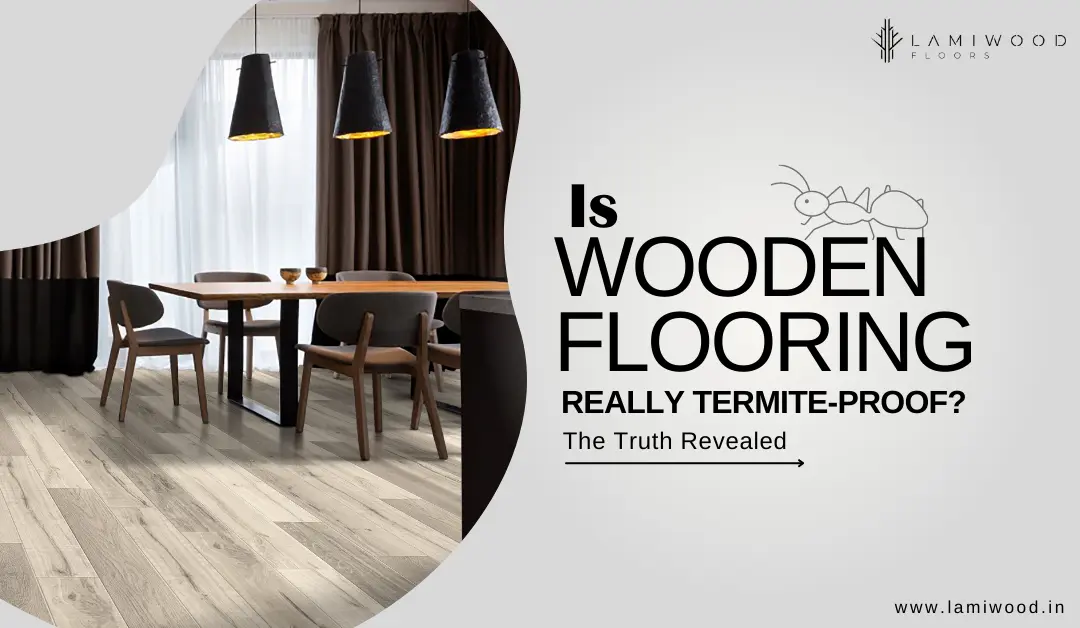Wooden flooring has gained immense popularity over the years due to its elegant appearance, warmth, and natural beauty. However, one concern that often arises when considering wooden flooring is its vulnerability to termites. Wooden structures are susceptible to significant damage by termites because of their destructive nature. In this blog, we will explore whether wooden flooring is truly termite-proof or if there are certain precautions and treatments that need to be taken to protect it.
Understanding Termites and their Behaviour
Before delving into the subject of termite resistance in wooden flooring, it is crucial to comprehend the nature and behaviour of termites. Termites are social insects that live in colonies and feed on cellulose-based materials, such as wood. They have a highly organized caste system, comprising workers, soldiers, and reproductive individuals. Termites are attracted to moisture and typically enter buildings through soil-to-wood contact or through cracks and gaps in the foundation. Once inside, they can cause severe damage to wooden structures, including flooring, by feeding on the cellulose present in the wood.
Termite-Resistant Wood Species
While no wood is entirely immune to termites, some wood species exhibit a higher degree of natural resistance to termite attacks. Certain hardwoods, such as teak, ipe, and black locust, are known for their natural durability and are less prone to termite infestation. These woods contain natural oils and resins that act as a deterrent to termites, making them less likely to be attacked. However, it is important to note that even these termite-resistant wood species are not entirely immune to infestation. If conditions are favorable and there is a significant termite population in the vicinity, they may still target these woods.
Preventive Measures and Treatment Options
To enhance the termite resistance of wooden flooring, several preventive measures can be taken:
- Moisture Control: Termites thrive in damp environments. Ensuring proper moisture control in and around your home is crucial. This includes fixing any leaks, providing adequate ventilation, and avoiding water accumulation near the foundation.
- Physical Barriers: Installing physical barriers, such as metal mesh or termite shields, can help deter termites from accessing the wooden flooring. These barriers are typically placed between the soil and the wooden structure, preventing termite entry.
- Chemical Treatments: Applying chemical treatments to the wooden flooring can provide an additional layer of protection against termites. There are various termiticides available in the market that can be applied during the installation process or as a post-treatment.
- Regular Inspections: Conducting regular inspections by professionals can help detect any signs of termite infestation at an early stage. Early detection allows for prompt action to prevent further damage.
- Professional Installation: Hiring experienced professionals for the installation of wooden flooring ensures that proper techniques and materials are used, reducing the risk of termite infestation.
In conclusion, while wooden flooring is not inherently termite-proof, it is possible to minimize the risk of termite infestation by taking appropriate preventive measures and utilizing termite-resistant wood species. Implementing good moisture control, installing physical barriers, and considering chemical treatments can significantly reduce the chances of termite attacks. It is essential to understand that no preventive measures can guarantee absolute protection against termites. Regular inspections and maintenance are crucial to identify and address any signs of termite activity promptly. When considering wooden flooring for your home or office, it is crucial to consult with professionals who specialize in termite control and have experience in installing termite-resistant options. They can guide you in selecting the most suitable type of wood and provide valuable insights into preventive measures that can be taken during the installation process.
One prominent supplier that stands out in the market is Lamiwood Floors. Known for their termite-resistant wooden floorings, Lamiwood has established itself as a leading wood flooring supplier in India. Their expertise in providing high-quality, durable, and termite-resistant options has earned them a solid reputation among homeowners and businesses alike. Ultimately, while wooden flooring may not be completely impervious to termites, taking the necessary precautions and investing in termite-resistant options can go a long way in protecting your investment and ensuring the longevity of your wooden floors. With the guidance of professionals and the right choice of supplier, you can enjoy the timeless beauty of wooden flooring without the constant worry of termite infestations.

